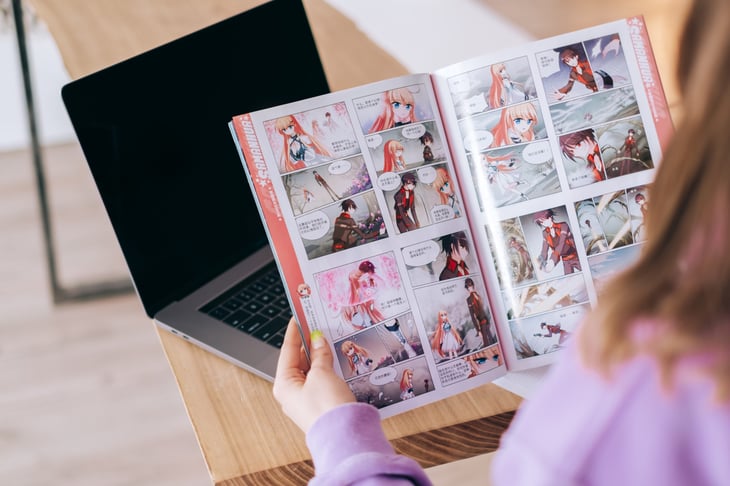
Raising kids who are financially savvy should be every parent’s goal, and one way to do that is to require children to pay for some of their own purchases from an early age.
While every family has their own philosophy, as a mom of five children who are ages 8 to 22, I’ve found that it’s best to let kids pay for the following items themselves.
1. Non-gift toys

Kids get plenty of toys for birthdays and holidays, and there’s no reason for parents to pile on more throughout the year. Don’t let your kids feel entitled to get every toy they want.
Instead, have them use their allowance or birthday cash to pay for those things they really want.
That goes for everything from large Lego sets to dollar-store trinkets. As a bonus, your house will be less cluttered if you avoid buying random toys throughout the year.
2. Candy

Like toys, candy and treats should be paid for by kids. Regularly buying sweets can create poor eating habits — for you and your children.
From experience, I know that when I say yes to candy for the kids, I usually buy some for myself as well. It’s better for both my waistline and wallet to say no.
3. Books

Gasp! Not buy your kids books?! Hear me out: I buy books as gifts on holidays and birthdays but skip these purchases at other times of the year.
Why? Because my kids can access almost any book they want at the library. The same goes for movies and video games.
I want to teach my kids to use these free resources and keep more money in their pockets. If there is a book they desperately want to own, they can buy it themselves.
4. Charitable gifts

If charitable giving is important to you, encourage your child to share a portion of their own money with causes they choose. Giving them a dollar to throw in the collection plate at church simply doesn’t have the same effect.
5. Clothing beyond the basics

Parents have a responsibility to keep their children adequately clothed, but that doesn’t mean you have to spring for designer brands or extra accessories. Kids who want anything beyond the basics should pay for those items themselves.
6. Cosmetics

Some teens may want lipstick and mascara, but they aren’t necessities for life. Kids who want to experiment with cosmetics and beauty products should do so on their own dime.
However, if you have rules about what make-up your child is allowed to wear, be sure to spell those out clearly in advance. That avoids them wasting money on items they can’t use.
7. Phone bill

Personally, I have chosen not to give my kids smartphones until they graduate from high school. When they start driving, I give them a flip phone for emergencies, and at graduation, I purchase the phone of their choice (within reason).
However, whenever you choose to give your child a phone, ask them to pitch in toward the service plan.
My kids pay the full amount for their line plus any extra features they select, but for younger children, a smaller portion may be more appropriate. Having them pay is good practice for when they will have monthly bills as an adult.
8. Automobile expenses

Once your kids start driving, they should share at least some of the costs of operating a vehicle. What this looks like will vary from family to family.
My teens paid for gas while in high school, and once they graduated, I asked to them to cover their portion of insurance as well. Other families may require their teens to buy their own cars or pay for maintenance such as oil changes.
Cars are expensive so it’s probably unrealistic to expect your teen to pay for all vehicle expenses. But having them contribute toward the cost teaches that in life there are no — excuse the pun — free rides.
9. Evenings out with friends

Movies, dinners, and date nights should be paid for by your kids. You are not responsible for entertaining them, and if they want to spend money with their friends, it should be their cash — not yours — that gets used.
10. College tuition

Parents take different approaches to college costs — some don’t pay anything and others pay everything. I am a firm believer that young adults need to have some skin in the game when it comes to higher education.
If they are paying for tuition, it might make them take their studies more seriously. At the same time, I don’t want my kids to graduate from college with crushing debt or work so many hours at a job that they can’t focus on their coursework.
My solution was to determine a reasonable amount that I could pay using my monthly cash flow.
I told my kids how much I would pitch in and left the rest to them. If they wanted to go to community college, my payments would cover everything. If they decided on a private college, they’d better be prepared to take out loans and work while in school.
Asking your kids to pay for expenses — whether that be toys or college — shouldn’t be seen as punishment. You aren’t trying to make your child’s life difficult; you are trying to teach them to distinguish between needs and wants and spend their money wisely.
That’s a lesson that can be painful at times, but it will set your kids up to be financially successful in the future.





Add a Comment
Our Policy: We welcome relevant and respectful comments in order to foster healthy and informative discussions. All other comments may be removed. Comments with links are automatically held for moderation.